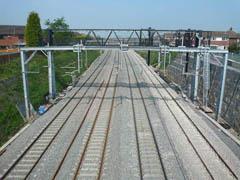
UK: High speed rail lobby group Greengauge 21 published a report on September 16 calling for a 1 550 km network of high speed lines. GG 21 Director Jim Steer said that the message was simple: 'what Britain needs today is a high speed network, not a single line'.
Fast Forward: A High Speed Rail Strategy for Britain was drawn up by a Public Interest Group formed by GG 21 in 2008. The report proposes an initial 385 km line from London to Manchester via Birmingham costing £19bn, including the government's 66% 'optimism bias'. The route would be extended in stages with a branch serving Liverpool and a line continuing to Scotland, splitting to serve Glasgow and Edinburgh.
The second north-south route would be needed partly to avoid development being concentrated on the western side of the UK and partly because the western route would reach the limit of capacity around 2040. The proposal covers a line from London to Cambridge, Nottingham, Sheffield, Leeds and Newcastle, continuing to Edinburgh partly over existing but upgraded tracks.
The east-west corridors run from London to Bristol and Cardiff, from Sheffield to Manchester and from Edinburgh to Glasgow. Of the three, only the Scottish route would require a complete new line. London's Heathrow Airport would be served by chords off the London - Manchester line converging at an airport station on the London - Cardiff corridor.
Suggested timings from London include Edinburgh and Glasgow in 2 h 40 min, Newcastle in 1 h 45 min, Manchester in 1 h 15 min and Birmingham in 45 min.
In contrast to the study published on August 26 by Network Rail, the GG 21 proposals envisage a direct link to HS1 for international services which would permit a notional 3 h trip from Birmingham to Paris.
The new lines would be able to handle 15 trains an hour in each direction, and GG 21 estimates that by 2055 the network could carry 178 million passengers a year. Services would be operated by a fleet of 378 trainsets, each 200 m long and able to run at 320 km/h. Total cost of construction is put at £69bn, spread over a period of 25 years. GG 21 estimates that the network as a whole would have a benefit:cost ratio of 3?48:1.
In a response to the GG21 report, Transport Secretary Lord Andrew Adonis said that 'expert opinion is now broadly agreed that high speed rail is necessary for the country's future prosperity and that over time we should be seeking to develop a network. The Greengauge report will be fully considered by HS2 as it undertakes its detailed planning work in the coming months.'
GG 21's Public Interest Group is formed of 18 organisations including Network Rail, airport operator BAA and city councils in London, Birmingham, Newcastle, Edinburgh and Glasgow.

















